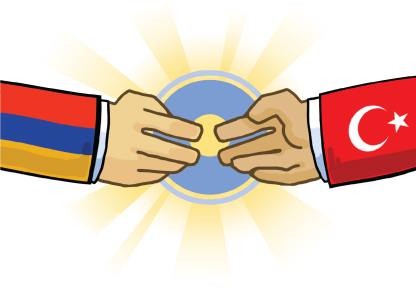Armenia needs to honor its people’s demands

By Carla Gharibian
Oct. 6, 2009 9:00 p.m.
The tentative agreement of diplomacy between Armenia and Turkey, which would reopen common borders and establish relations between the two, remains in the shadows of the larger issue of Turkey’s denial of Armenian Genocide.
With continual rejection of claims of the deaths of approximately 1.5 million Armenians under Ottoman rule more than 94 years ago, the Turkish government simply cannot ignore what they have seemingly deemed a merely symbolic issue, and the Armenian government must likewise come to a similar realization.
Turkey must acknowledge these mass murders as well as reject the dismissals of their significance in the big picture of Armenian-Turkish diplomacy if future relations are to go beyond the shallow path that is currently being pursued.
Sunday’s protest by thousands of Los Angeles’ Armenian-Americans at the Beverly Hills Hilton, where Armenian President Serzh Sargsyan was staying during his Los Angeles visit, are a testament to the adamancy toward the cause. This follows recent protests in New York and Paris, as well as Glendale, the Armenian hub in Los Angeles County where thousands attended a Sept. 27 rally.
The major point of contention is the provision in the agreement between the two nations. These provisions would call for the creation of historical commissions to investigate the validity of the Armenian Genocide claims, which the Turkish government not only disputes, but rejects in favor of claims that Armenians were equally brutal in the slaying of Turks during the period.
The objectivity and manner in which such investigations would take place are questionable. President Sarsyan must not fail to realize that an acceptance of this tentative agreement does not address the concerns of one of the most significant players in the situation: the citizenry of his very nation.
Ethical necessity aside, it is the lingering emotion from the genocide among Armenians worldwide that makes these very preconditions and commissions downright insulting.
It is one of the defining historical moments of this minority, having perhaps as significant an effect in molding modern Armenian culture as their unique language and Christianity. Accepted by many in the international community as historical fact, the systematic killings have been anything but forgotten among the Armenian people.
Recognition of the genocide by the Turkish government would be an act of good faith that would have tremendous repercussions for popular sentiment toward diplomacy.
If approval of these tentative agreements beyond the government of Armenia is to take place, it is the opinion of the citizenry that must drive it.
Favor of the ties between the two nations will likely hinge on the utterance (or lack thereof) of the “G- word,” and intervention and pressure by the U.S. will no doubt be a major factor amid the agreements.
President George W. Bush saw Turkey as too important an ally, both politically and strategically, to alienate the nation by officially recognizing the event as a genocide. A similar lack of recognition, most recently with President Obama’s inability to term the event “genocide,” despite previous statements in which he did so, have come up with dismal results.
In the context of solely Armenian-Turkish relations, the United States aside, simply evading the “G-word” will not be met with as much laxity. Countless Armenians are affected by the deaths of family members joined by a more unified national pride than is seen in countries where members of the diaspora can be found. Opposition of a significantly larger magnitude will face the lack of an accurate title for the events of 1915.
Ultimately, the question inevitably arises: Why should a seemingly archaic event stand in the way of impending diplomatic ties between two nations? Especially, what validity do the opinions of a 19-year-old, and an Armenian one at that, have in this debate?
Despite nearly a century passing since the Armenian Genocide, elapsed time should not invalidate these genocide claims. Just as the tragedy of the Holocaust is associated with such memorial and emotion, it is a link to the psyche of a people makes remembrance such a crucial part of this culture.
This inevitably brings up the desires and sentiments of the Turkish people. There is no simple solution when national pride is so intricately tied into a debate.
Though my last name may divulge my ethnic roots, it does not divulge ethnic bias. This is not solely an Armenian issue. Given acceptance among historians in the international community of the Armenian Genocide, as well as acceptance among major publications and texts of the event, the genocide is not recognized solely by a minority whose nation was directly affected. The New York Times and countless other major newspapers simply do not refer to “allegations” of genocide.
With laws forbidding expression of dissent with this long-held belief in Turkey that no genocide occurred, as well as overwhelming evidence to the contrary, skepticism should be paramount if an objective stance among those who reject these claims is to come about.
E-mail Gharibian at [email protected]. Send general comments to [email protected].


